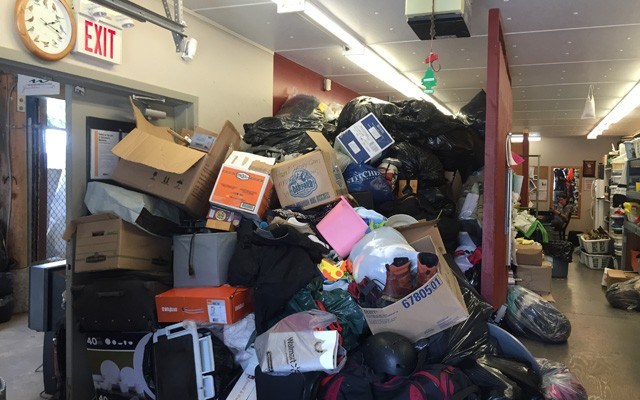Whistler's Re-Use-It Centre was buried alive in donations in April with a record-breaking 4,071 bags of stuff.
That's a staggering 135 bags every day of used clothing, toys, outdoor gear, books, pots and pans, you name it.
This is the tarnished gold in Whistler's unassuming little goldmine. Last fiscal year the Re-Use-It Centre (RUI) transformed donated stuff into $804,000.
"We make that money one dollar at a time," said Cheryl Skribe, executibe director of the Whistler community Service Society, the registered charity that oversees operations and diverts the money, after expenses, into social programming.
"Can you imagine the amount of items that we price, that we go through? It's mind boggling how many items we sell."
Augmenting the Re-Use Centre's success is the newer Re-Build-It Centre, which brought in $239,000 last fiscal year, and combined with recycling donations of $75,000, the stores are bringing in more than $1.117 million.
They are undoubtedly the lifeblood of the WCSS organization with its $1.4 million in revenues last year. Overall revenues from the two centres are topped up with donations and government grants, as well as programs and membership fees.
"The Re-Use-It and the Re-Build-It Centres are going concerns," said Skribe. "They're businesses and they're legit businesses, as far as the demands that any business has on the people that run it."
There are seven full-time staff at RUI and three part-time. At the RBI centre there are three full-time staff and three part-time.
Staffing costs for the operations came in at $453,000 last year — 40 per cent of the money made by the RBI and RUI.
"For us to be able to stay transparent, for us to maintain control, for us to be able to have structure and a standard that is really worthy of the community investment in this, as far as the amount of stuff we get in there, we really do have to have a dedicated staff," said Skribe.
Wages, by far, are the biggest expense at the centres. But add in rent, office and general, bank charges and insurances, to name a few costs, and the total costs to run the two places rose to $618,000.
On top of that there are the expenses of running the WCSS itself and again wages top the list.
A further $303,000 goes toward WCSS wages, which is primarily the outreach workers and the Food Bank coordinator, the staff that is directly involved with social services.
Program supplies then account for $238,000.
It's these two numbers combined — more than $500,000 — that is roughly the direct community benefit in delivering social services, said Skribe.
The charity has other expenses too — telephone and utilities, advertising, accounting and legal.
"One of the challenges that any charity runs into is that to run a charity and to run programs you need people and people cost money," she said, explaining that oftentimes those are the things that people don't want to fund support of with money, preferring to see their donations go straight to the cause.
But without them the charity could not function — there could be no partial support for school lunch programs, for example, without admin to work out the details and cut the cheques.
"We now have this pool of money (with RUI and RBI) that we can cover all of the costs to run the charity and the wages.
"We run the store super tight, so that our expenses are as low as possible and that allows us to get the maximum amount of money to these programs that goes back to the community.
"...The community donates, the community purchases, and the community benefits from the social services programs that we provide.
"It's really magical."
It's not always magical on the frontlines, however.
This is the place where designer jeans at Re-Use-It prices can make someone's day, or where old family photos get lost forever. It can be a place where one-of-a-kind finds lurk around the corner or where an urn full of ashes ends up (presumed to be a pet's) — even dirty underwear sometimes get donated.
These types of donations turn up often when seasonal workers drop off their goods on the way out of town forever, or when property-management companies hire crews to clean units.
"It's the greatest and the grossest job I ever had," said Skribe.
"The biggest message that we tell people over and over is: don't donate something that you wouldn't buy yourself."
The social enterprises (the businesses run by WCSS) fund 85 per cent of WCSS.
Last year 724 metric tonnes were diverted from the landfill. At $120 per tonne that's $86,000 in savings to the community. And that adds up year over year.
Plans are in the works to move the RUI to the expanded Nesters recycling site in the coming years. That's why the municipality bought the neighbouring Fortis site for $1.2 million in 2012 with plans to expand that recycling depot facility.
WCSS has almost $350,000 in its building fund that will likely go towards a new facility.
As a key player in Whistler's recycling and reuse it equation, this move to a more central location makes sense.
"We know that this is something that we need to protect and keep strong," said Skribe.
The WCSS's fiscal year ends March 31. The most up to date financial statements are set to go the board for approval at the WCSS AGM in June.




